Mumbo Jumbo Infumbo
Not sure when I wrote up the below—probably within the last couple of months. I added a bunch more material about it in this second iteration, and split the mumbo jumbo into a couple of parts. The first part is about some issues with the news, advertisements, and marketing in this digital age. The second part—if you can make it through this long-winded post—is about developing a framework, borrowed from a food nutrition-based analog, to deal with it.
And while all ideas evolve, in this post matters are less settled. So forgive me in advance for any more incoherence and broad brush strokes than usual (ironic given the subject matter). Hopefully this can be a start of fun conversations—while writing this down on the subway, there wasn't a real impetus for this post other than to spark good chats!
Part I: The Issues
Captain Hook
I have had a pretty compulsive addiction to browsing news.google.com for a bunch of years, an addiction that gained strength freshman year of college. In the middle of writing papers late at night I would find myself (often as a reward for finishing a page/section) browsing the google news articles, and on occasion videos on realclearpolitics.com. What bothered me was both the amount of time I found myself spending on redundant news of which a good amount didn’t seem important in the scheme of things, as well as how scattered the time was. Despite it not being satisfying, I found myself coming back to the google news homepage time and time again.
In the past year I’ve grown more distanced from news-browsing. Click-bait seems to have taken over many news outlets, I suspect partly driven by the increasing reliance on data analytics to drive click-rates and ad revenue. Though I can’t be sure if it’s actually happening more, if I’ve finally noticed, or if my eyes are just progressively dimming coloring my view of the news in a pessimistic feedback loop. Alternatively, it could be I’m looking at a biased sample pool of news aggregation sources like Google News that ranks those with better click-rates higher. To get a sense, check out the below screenshots I’ve captured recently. It’s from the Pocket (article saving app) extension in Chrome I have—when I open a new tab in Chrome I see trending stories.
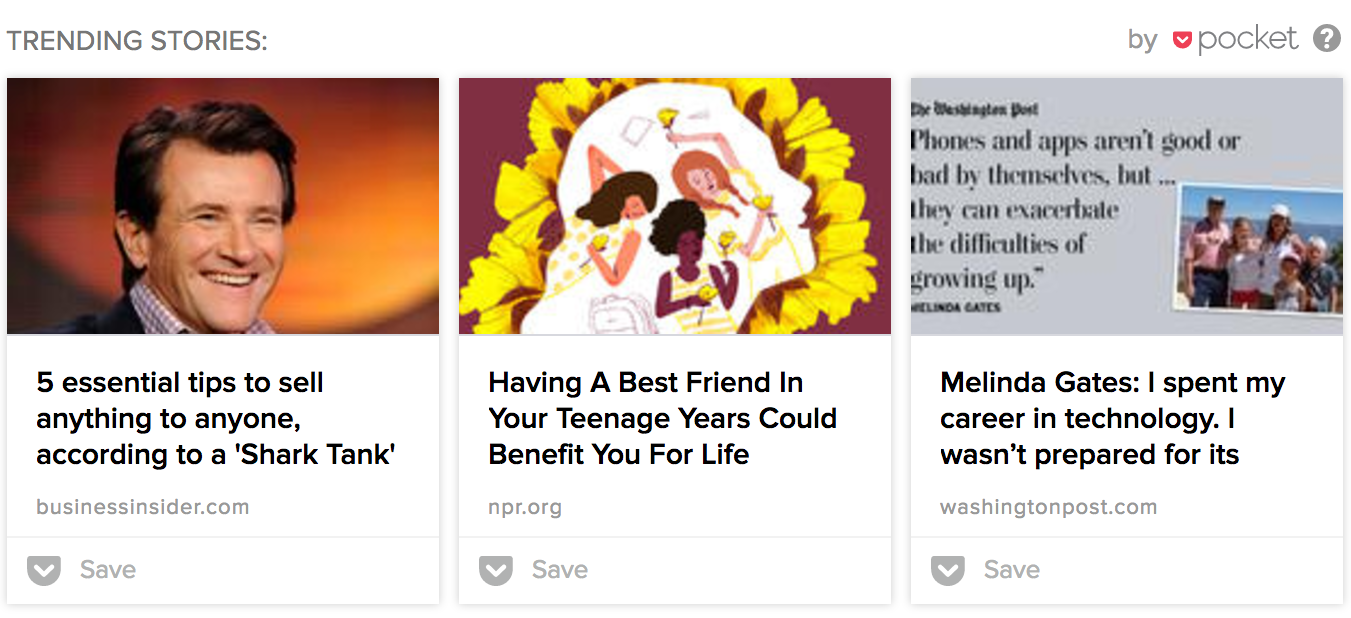
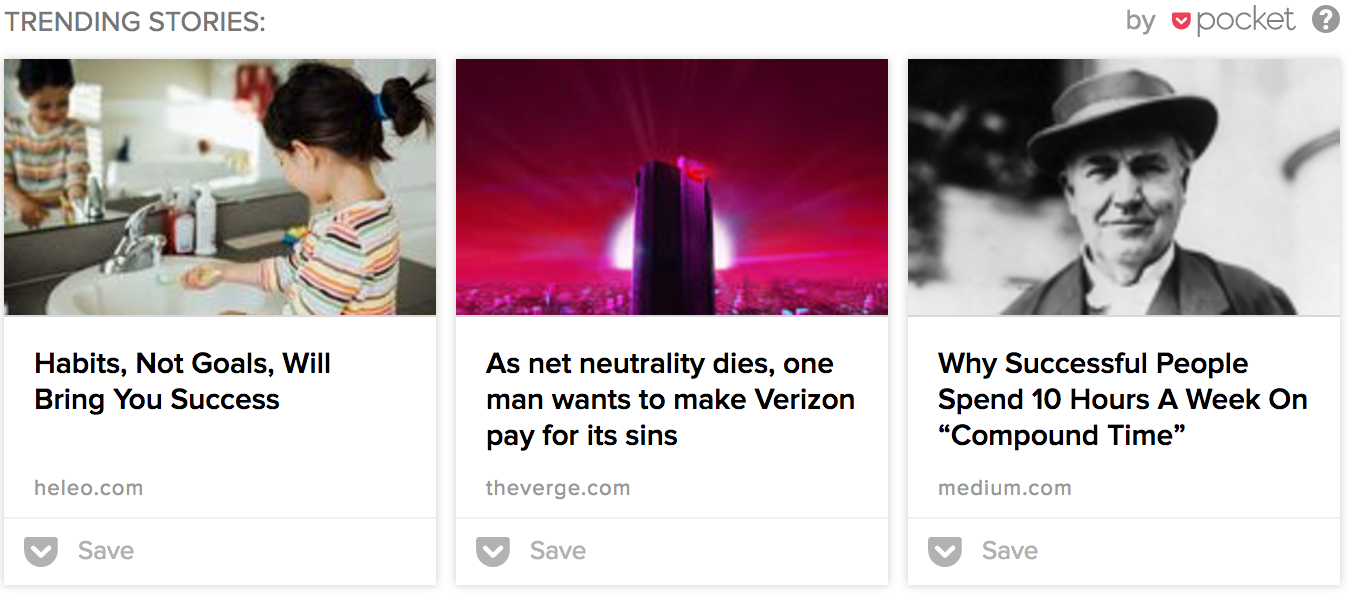
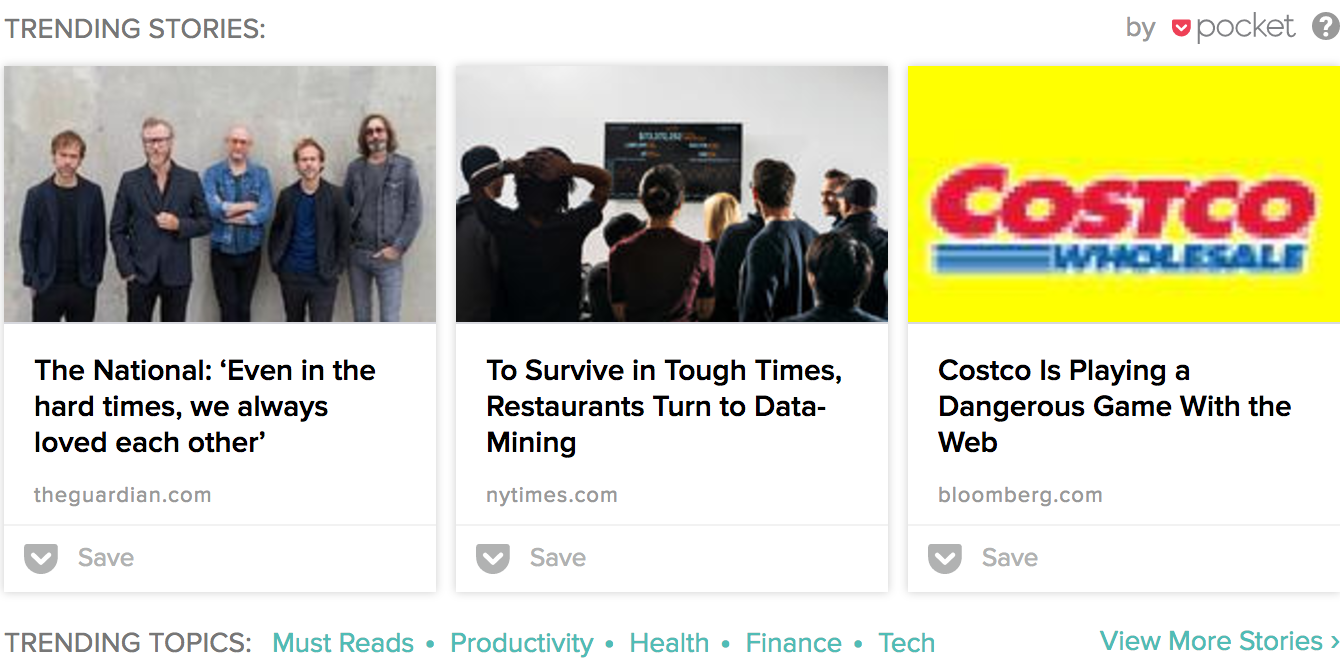
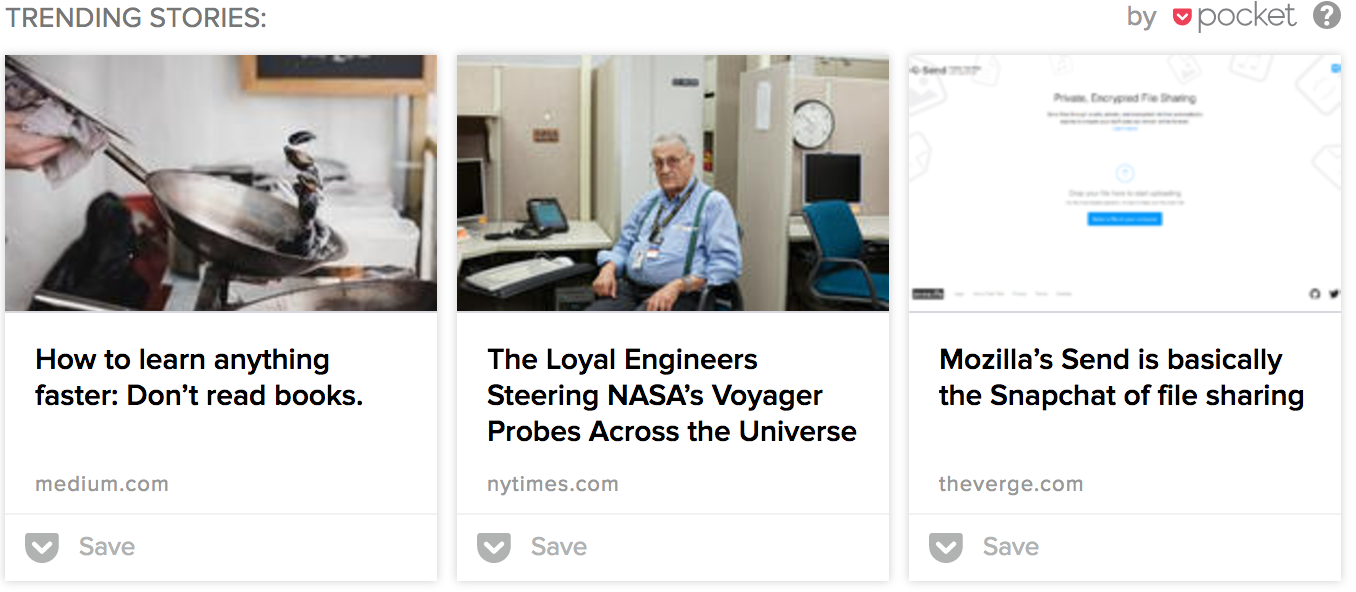
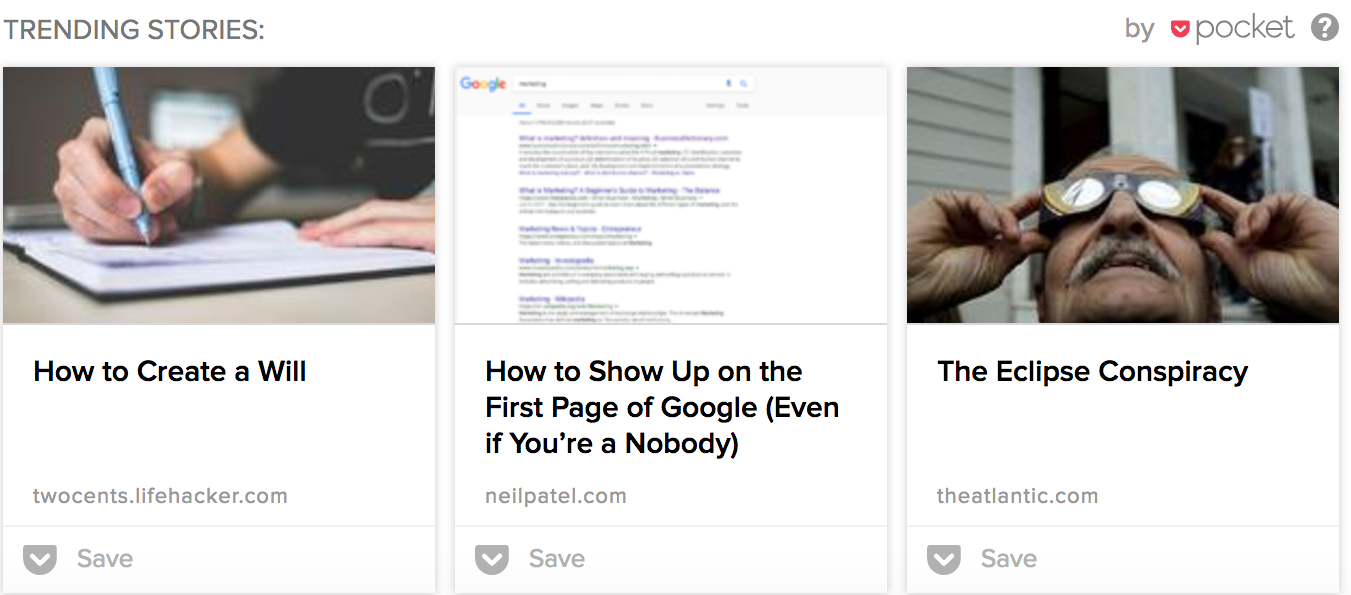
The titles seem to have these marketing “hooks” or click-bait that fall into a few broad categories: hooks dipped in snake oil claiming to provide extraordinarily insightful and hyper-relevant information (how to get rich, how X company runs the world, why you don’t sleep well at night, what anxiety means for your life, etc.), hooks that are ambiguous, mysterious, or with partial information (“The New Divide in Culture”, “The Hero in Venice”, “Zebras Might Go Extinct and Here’s Why” etc.) and hooks that are matter of fact descriptive with a ‘mic-drop’ (“Buffett: This is Gonna Change Everything”, “You’ll Never Believe it. Eat More and Live More”). I’m sure there are a hundred other ways to categorize, and a lot more to add to this group (celebrity hooks, sex-sells hooks, etc.), but this is the kind of general stuff that has come to mind first.
Browsing the news had begun to feel more like swimming in a sea of hooks with personalized bait. Not that hooks are bad in it and of themselves, after all, if certain articles are clicked more than others—what's the problem in that? But not all the content is of such great quality—reflective of the 24 hour news circle competition, rather than the journalists. It’s one thing for a book with months of work behind it to claim this is how you can lose weight, it’s another if the advice on how to lose weight comes from someone that pulled the lowest hanging fruit on the web before a noon deadline. I wouldn’t be surprised if some go so far as to reverse engineer an article into a hook. I’m sure we could find something about an obscure zoonotic/zebra disease that would lend some content to write an article titled, “How Cute Zebras Might Go Extinct”.
Waldo's Role Reversed
And it’s not just news-related organizations, these marketing techniques are popping up all over. For startups that don’t have a clear path to profitability, data-driven advertising hooks have been a way to drive revenue. With so much digital info out there a lot of money is going into monetizing it, and some peeps are developing more effective hooks to get people to see their content.
We are in an age where there’s no more worrying if you can find Waldo. Waldo is now armed with a lot of cash and technology to make hooks to ensure you see him and justify his existence (if not financially, even a click of recognition from a Google search will do!). Just don’t mind that there is a sea filled with Waldos now with their population doubling at an exponential rate—Waldos are marrying Waldettes and little baby Waldies are being born into a world with the expectation to join an ill-defined complex existential fight for our attention. If a Waldo exists but no one is there to find it, does it truly exist?
A few years ago, there were enough from population Waldo to go around. Waldos felt proud by the attention they got, and the public paid them commensurately. But in 2017, the public hasn’t been able to support the growing number of Waldos like it used to. In response to these changing times, Waldo mercenaries are being hired, and baby Wadldies are expected to learn the techniques to fight these guns for hire. At an early age, young Waldies are taught how to navigate the complex world of how to ensure they can get be found, whether on social media or the digital billboards across the webs. And even when Waldies graduate with a diploma, the schooling doesn’t end—Google, Facebook, and the beastly giants in the space can change the rules on the dime—continuing education is a must. Then there are companies like Amazon that are getting into the game of creating a whole self-fulfilling marketing ecosystem around their own platform—Waldos must be on their toes to capture new opportunities before the cost-to-enter gets inflated. Some Waldos decide to take the risk and strike on their own, reverse engineering the process by creating their own platform where they—and their family of Waldos—can exclusively be seen.
Yet sadly, Waldos from lower socioeconomic backgrounds find it harder and harder to make ends meet without the resources to play the Google/Facebook/Amazon revenue game. Further complicating the lives of young Waldies is the uncertainty with measuring the incremental value provided by these tools. Was I really found only because I fed the marketing platform beasts? Yet the risk of not paying for it could mean ending up in the waste bin of cyberspace. To make ends meet, some Waldos have resorted to hooking themselves to the dirtiest platforms on the web. Exchanging slime for food.
Lately, real estate developers have started to build cyberhomes on the web specifically to rent out to homeless Waldos, but it’s an unsustainable life. And living off the fat off large corporations willing to throw a few dollars to them doesn’t help, either. Waldos live a fragile life, with a brief sweep of pen in the a Terms of Agreement can mean life or death.
The days of Where's Waldo is over. It was a brief moment around the turn of the second millennia that has since faded into a distant past. Ironically, though—with all the Waldos out there, finding the Waldo that’s both good for you and good for the Waldo isn’t so easy.
Will the real Waldo please stand up?
Coolio’s Money & Marketing Paradise
The issues that the Waldo population faces are part of these growing pains in the digital marketing economy. There’s a ton of money behind this space right now. Check out the difference in top market cap of companies in a 7 year period. Notice two ad-driven revenue companies that entered the picture today (google, facebook—notwithstanding as a friend noted how a lot of these companies are using the marketing revenue for things not directly related to marketing, like indexing the web).
Below is from 2010:
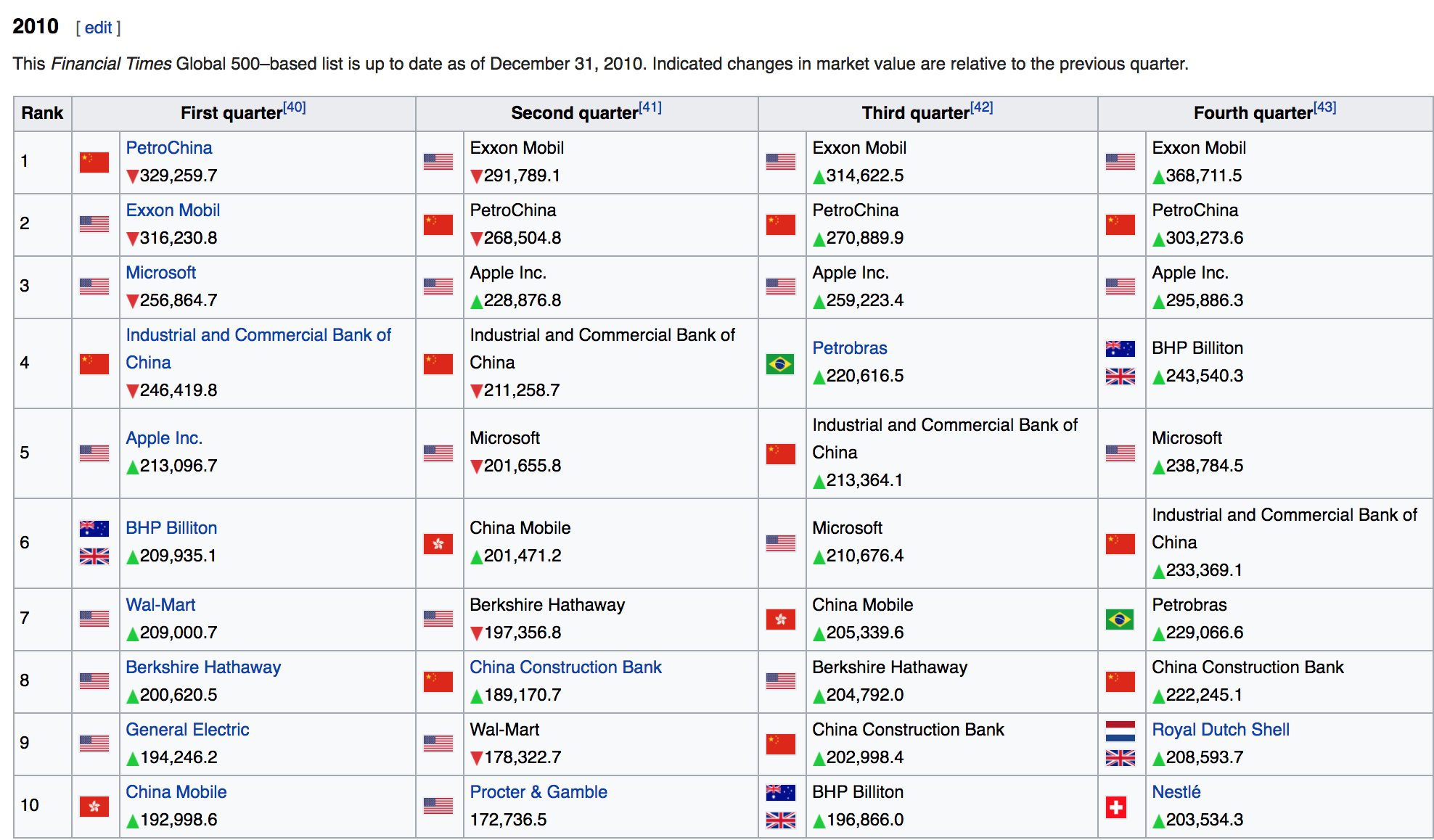
Below is latest from Sept. 2017:
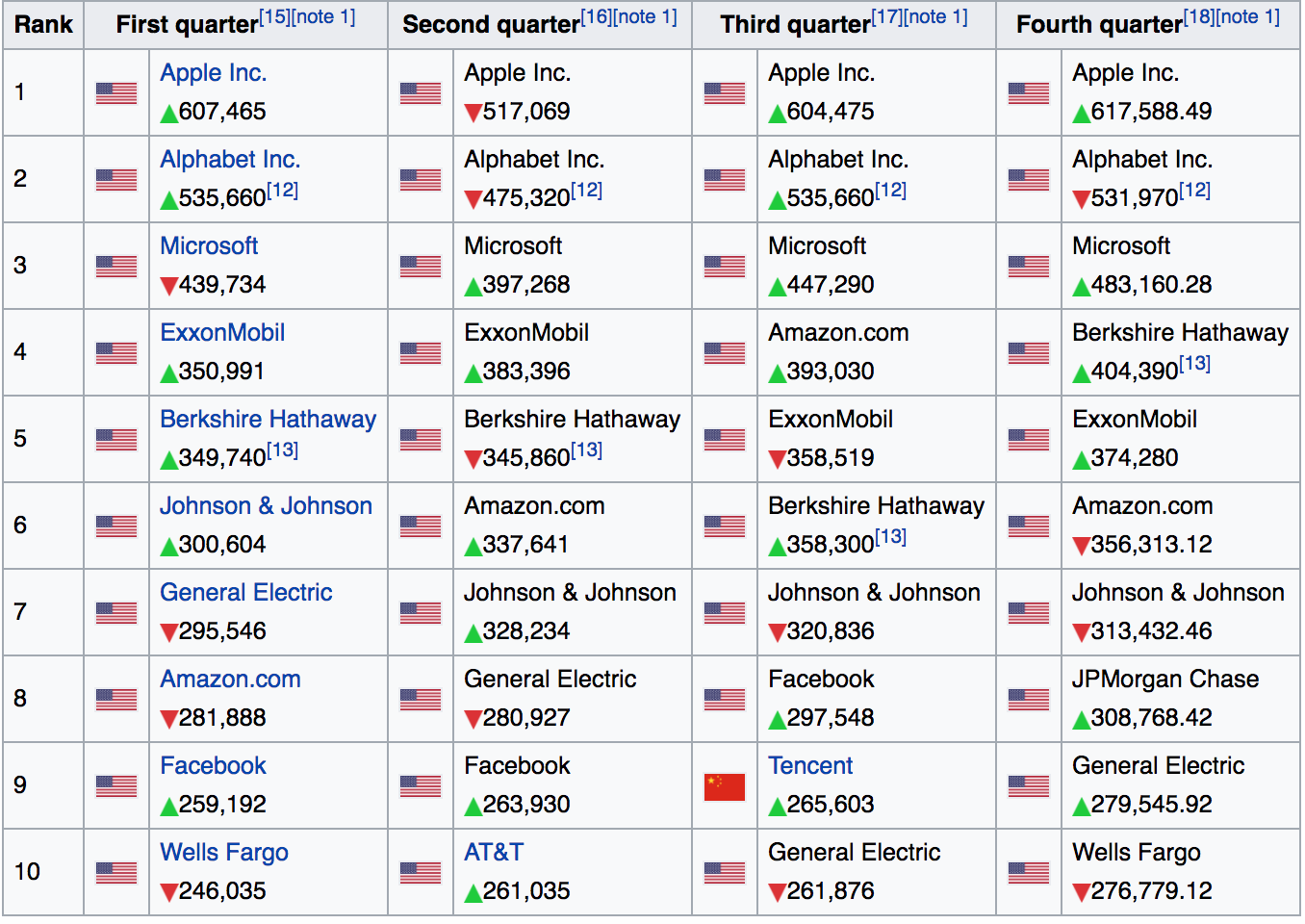
Also reminds me of this clever Economist cover:
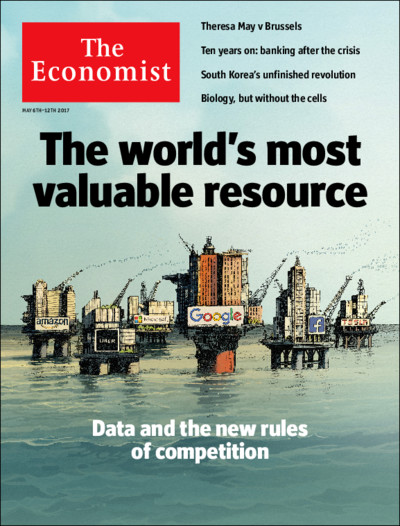
And beyond public companies, the private tech markets seem to be taking in a lot of funds now, too. Part of the reason for the capital flooding the tech space might be because with interest rates low, and VC’s becoming more mainstream, a higher portion of the public’s funds are finding their way to tech companies and startups—who are then in turn spending their efforts creating better hooks with data. It’s funny to step back and think that the money of employees are finding their way through pension funds into venture funds and into the pocket of a startup using it to buy ads in a subway.
We have startups promising the Perfect X. Reinventing Y. Reimagining Z. As much as it is beautiful to see the possibility for humanity to craft a future with limitless potential, many products aren’t selling such innovative products as much as reselling a product with fancier marketing angles. It’s one thing if some of the companies were developing better hook technology, not polishing them with age-old snake oil with the extra 2M of padding raised from their series B financing round. Though in fairness, even without an underlying ‘innovation’ providing or value-add, if they are capturing market share and recycling it into fresher business and operation models, there’s a value add there. (Leaving aside the crazy valuations, inefficient business fluff, and post-profit mindset for another time.)
Marketing is of course not new. The concept of marketing something—fluff or not—is as old as the cavemen who wanted to offload their excess produce to a nearby tribe (“these berries provide the perfect holdover while you hunt for a wooly mammoth!”). There are two main things that seem to differentiate 21st century marketing from cavemen marketing though.
The first is the growing interaction with digital platforms provides a pervasive medium for people to market their products or ideas on virtually unlimited real estate, and through expanding forms of media whether email, social media, or the latest push notifications. 50 years ago marketing techniques could reach our homes through mailings and the like, but they didn’t have a way to follow us around as easily on lightning-fast digital platforms with a society that has come to rely heavily on mobile usage.
And the second is how the growing analysis of data is providing marketing with new hyper-effective personalizable dimensions—through A-B testing, cohort analyses, and scores of other techniques. Hundreds of billions of dollars of market cap are driven by ad revenue that is made possible by personalized targeted marketing. And while there is something to be said for personalized marketing as being more helpful, it’s ultimately about the interests of the marketer, not the potential buyer. The fact that Coca Cola can now tailor their ads to speak to more health conscious buyers in one way and less health conscious buyers in another way is all fine, but that doesn’t change Coke’s nutritional profile. Hooks across industries are increasingly being personalized through data science, either explicitly as advertisements or more implicitly through news headlines.
Data science is an exciting new field that is already showing promising fruits. It has so much potential to make the world a better place. But as much as it is transforming medicine, it is transforming marketing.
Plastic Minds
There are a lot of hooks out there, and the hooks are more personalized. Word up homie. But marketing can actually have an impact. Beyond having a direct causal effect in how we spend our money, it can more broadly impact how we view things. Take a Dannon yogurt ad. Beyond saying ‘buy this Dannon product’, it’s also putting forward a view of dairy and its purported health benefits, wherever one might stand on the issue.
Many of these hooks are designed to shape our worldview and set of deeply impactful beliefs, influencing the emotional-economic weight we put on products/services/ideas for what’s good for us to live a happy life. It is rather explicit with industry associations that have this exact goal to perpetuate their industry’s agenda. I don’t doubt their sincerity or the sincerity of any marketer (necessarily)—I’m sure many really believe what they are marketing. And it’s probably a self-selective group of people that believe in what they do who go into that business in the first place—you don’t often see vegans leading meat packing companies. But whatever the individual motives behind a given marketing campaign, the goal can influence how we see the world.
And sometimes the effects aren’t intended or necessarily desired by the hook-maker. I don’t think those working for Calvin Klein or Victorias Secret have a personal agenda to promote an idealized body type, but it’s what enough of them there in the board room believe sells best right now. And they have a fiduciary duty to their shareholders to act accordingly—until public opinion and the power of the purse changes it's tune (it seems it is slowly happening).
I’m no luddite. Even if marketing isn’t ideal or the most efficient setup, I probably owe thanks to marketing which greases the consumer wheels, and keeps things chugging along. I'd be remiss if I didn't acknowledge that at least indirectly it helps ensure I get a paycheck right now, and I suspect almost anyone’s paycheck can partly be traced back to revenue driven by marketing as well. Otherwise, we might want to shop around for another economic system (Marxism might work better there :D).
The notion that our environment effects us is old news—but what is different, however, is that is we are in a world with far more content than ever before, often personalized and marketed directly to us.
Part II: Flexible Frameworks
Whether by Land or by Sea, or Air
The prevalence of data-driven marketing to influence our choices does not have to be a one-way street. The same wide open door provided by marketers to reach the public on digital platforms allows us to reach an infinitely expanding world of ideas and beliefs that can form a more deliberate positive feedback loop in shaping the worldviews we want. We can crowdsource the incredible bounty made available around the world wide web, and leverage technology along the way to assist us.
A similar thing has happened with food in the past 50-100 years. Years ago people mainly had what was produced locally, and while a ‘dietitian’ could talk about the importance to eat in moderation, chew your food, talk about stuff on herbs/medicines, etc.—there was less s/he could do about providing recommendations for actual foods, there simply weren’t as many options. Today, however, a growing fortunate number of the public in America have access to a virtually limitless world of food. In the winter, those in NY can have oranges from Florida (goodbye, scurvy!).
Without a general framework for what it would mean to live a healthy lifestyle, how can one decide what to eat? Rely on cravings or marketing bombardments from companies? If there’s a value add to dietitians (real or AI), it’s keeping some awareness around the food choices we make and providing some framework—whether templated or tailored—for how to sift through it all.
Like the move from local-based eating to global, we now have similarly a tremendous amount of content available to us. We can just take whatever hooks are in front of us, or we can have a framework to navigate. And the analog would be an information dietitian (“infotitian”), a quasi-learning/content consultant that curates content. A framework to account for all aspects that one might categorize content—the political slant, the medium (content—push notification based news, google news based news, magazine based news), the subject matter, the country of origin, the author(s) background(s)-there’s all kinds of ways of slicing it. I came across this (ironically through Pocket), on short vs long term knowledge (check out page 7 here), yet another category to think about when categorizing types of content.
We could imagine a person, whether on their own or with an infotitian, putting together a balanced portion for the right macro and micronutrients-a few articles on ABC here, a dash of some books on on XYZ there, a couple of movies, a few documentaries across these genres, and so on. I’m sure there are consultants basically doing that already, though the thought of giving all that decentralized hook-making power to one central infotitian probably isn’t the best either, sounds like a 1984 thing. It would also give Waldos a direct strong point of access if they can in turn market to the infotitians. But whether this is a real infotitian working with the client, some artificially-intelligent online tool to help, or someone deciding on their own, we should have some say in shaping the kind of person we are. Instead of leaving it to Captain Hook. And perhaps a community (‘infommunity’? :)) of do-it-yourselfers will pop up that show best practices and what has worked for them.
Hopefully we can learn from some of the challenges right now facing the nutrition space. One obstacle is the lack of personalized approaches. That’s more straightforward. Another issue though is how ‘overly normalized’ the debate among competing diet ideologies has become. ‘Normalized’ in that the questions of what is healthy is looked at in a good vs bad light. Instead of saying empirically A does B, we are saying A is bad. Or if we are going to normalize stuff and call things good/bad, at least doing so based on a person’s particular metrics-driven goals.
It’s not about vegan, calorie restricted diet, or paleo, but how each has its own strengths and weaknesses relative to the person and their goals. An athlete has a different need of nutrition than does someone more sedentary. And even within athletics, a long distance professional swimmer will need a different set of nutrient-needs than a football player to achieve their specific goal. And then even in each sports discipline—each person’s biology is different and depending on what one’s ultimate aim is a different nutritional profile is appropriate. How information shapes us is no different, especially where past information has an outsized influence in how we perceive and related to future information.
Por Exemplo
The below is a news framework I sketched up and have been using lately:
- Economist Espresso (daily)
- TheSkimm newsletter (daily, occasionally)
- TheHustle newsletter (daily)
- The Week newsletter (daily)
- The Economist magazine (weekly)
- Science magazine (weekly)
The above definitely isn't ideal. Throwing in something monthly or quarterly would better round it out. And would probably want to change it up over time to get differing perspectives. It has way too much an urban-city POV as well. The Economist often seems to have their nose stuck too far up in an idealized European ivory cloud, and since I’ve joined theHustle it appears to be a water hole of startup koolaid (though I’ve been a subscriber for 10 years in the former, and have read almost all the daily emails in the latter :D). The framework is small and a work in progress whether high in the clouds or drenched in a pool of frenzy—there’s something to learn.
Kicking the google news habit was harder than I thought though. I was going use a website-blocker, but thought I should probably figure out how to get over it internally. For a few weeks I’ve found myself hitting control+T+”NEW” (to open up a new tab, starting to type news.google.com with the autofill), and sometimes still instinctively pressing enter. I didn’t realize how hard-wired the habit was until I really tried to kick it.
Since I’ve stopped actively browsing the news and started relying on a few curated sources the past couple of months, it’s been refreshing with less distractions, and I don’t seem to have missed that much. For non-news content, right now I probably spend 65% on audiobooks, 15% on podcasts, 10% articles, 10% on books. I’ve been trying to expose myself to perspectives and ideas that I wouldn’t normally get—like in a Crane Rental podcast I listened to, and a new one I have on agriculture. (The same way information can pull apart a democracy, it can also forms bonds of empathy and understanding to bring it together by breaking down info-barriers between groups.) I don’t have much information on my content habits beyond that (though funny enough, I had done a mockup at one point on a site that would track and analyze this stuff).
Just as microscopes get finer and finer, opening us up to a world of different groups of compounds that affect our body in certain ways and helping push nutritional science into steadier ground—so too with all this infromation. Over time we’ll probably develop the language to better parse and group angles/levels/groups of the affective side to information.
And beyond news and learning-related sources, movies and other forms of content consumption can be integrated as well—they have an impact on our plastic minds just the same. I haven’t watched a movie in a while, but I can tell ya—when I watched Batman Begins (as part of a 7 hour stationary bike), some of the scenes have made a lasting imprint. And I suspect there’s a bunch of stuff that we don’t remember makes subconscious impacts on us as well.
No Mo' FOMO
Yet any framework, aside from the fact that it’s imperfect in what we choose, it is also imperfect in what we leave out. Frameworks are about what we choose as much as what we don’t choose, and that filter is gonna have its drawbacks (a Farnam Street post on that). There probably should be a degree of room for spontaneity and exploration baked into the framework to catch any stuff we each would want that might fall outside. (Props to brother Nick who picked up on this issue immediately when I rambled about it.)
Sometimes that filter might involve the fear of missing out. When filtering information, there’s gonna be that risk that we would miss some hook that people are talking about. There’s a kind of insecurity that I would be ‘that person’ that doesn’t know what is going on, labeled as the guy with the head in the sand. Growing up in an environment where learning and ‘knowing stuff’ is important and valued, this insecurity can be rather acute.
I haven’t found it to be such an issue thus far. And if I ever come across something that flew over my head (whether a piece of news or a movie), there’s only that one time I don’t know about it. It's not like I'm missing what Allepo is. ;)
There’s another concern that if we miss out on some stuff, we might lose that connection with people on whatever is the latest hook. But if the time is spent elsewhere with stuff that a person finds a bit more meaningful there will be ways to identify with people through those channels. Like if instead of reading through google news again someone might instead read about a band (or even messing around on youtube learning an instrument), and that adds another nice touch point to chat with someone about music.
In any flexible framework, balancing the filter with spontaneity is key to serendipitous paths that might not have been taken otherwise. And even if spontaneity isn’t baked into a the framework, just being around people—especially people not from the same background different from us—will help round things out.
Bendy Straws
This stuff seems a bit crazy. But at least for now appears to be one way to deal with this ever increasing world of information and content. We can either rely on people trying to make money by competing for our attention on what/how to think about (hard to blame em—people gotta put food on the table), or we can develop flexible frameworks to help manage and sift through it proactively. One way or another, someone is going to be influencing the kind of stuff from this insanely large world of information now at our fingertips. The question is: do we want to have a say in the kind of stuff that molds us?
If we are mindful and conscientious about the kind of things we care about and can develop some sort of even rudimentary personal framework to address it, we can better leverage the digital age’s bounty for things we find really meaningful. Not making a choice is a choice itself, leaving it up to Captain Hook and Waldos trying to make ends meet.
Making a framework need not be overwhelming or overly time/bandwidth-consuming. Thinking about how we are thinking will shape our thinking which shapes the thinking of our thinking of our thinking in turn, and so on—but we don't need to get stuck in any infinite loop. :D Just hitting the reset button briefly and thinking about what are the kind of news sources we’d want to ideally browse, the kind of books we’d want to explore, and the documentaries/movies we’d love to see could be helpful. Providing a kind of second order layer of awareness—thinking about the kind of framework in which we want to take in information, rather than the individual pieces of information themselves. And even if we don’t follow through with answers to any of the questions, asking the second-order question may help so that the the next time a hook comes around, it’s evaluated with bit more context of the things we care about. Though beyond that, thinking about the ways we want to take in information leads to questions of the kind of persons we want to be—which of course is a lot more than a three minute thought exercise.
There’s a balance needed here, if we’re spending time thinking about what to think, we might miss doing the actual stuff that needs to get done. And that’s where a flexible framework comes in—it’s about some imperfect yet bendable system so that we can have a working guideline so these smaller moment-to-moment decisions are done more on autopilot, mindfully but without over-analyzing the basic principles of it all each time.
Also, there’s this funny duality I’ll hear sometimes—do we make who we are or discover who we were already? Does existence precede essence or vice versa? A kind of existentialist vs platonic argument. This post is mostly using the language of creating and shaping. But if you would prefer, you can find+replace the words make/shape/create with discover/find/uncover words like actualize, or whatever verb best describes your meta-worldview. :)
In the past 15 years we’ve had an explosion of resources at our fingertips. When more opportunity is available to us, it begs the question of what we want to do with it all, and how to make the most of it. Like the similar question of ‘what do I want to be when I grow up’, this is a first-world ‘issue’ couched in a tremendous blessing. It's an incredible luxury to have the time and place of mind to even entertain these thoughts, and not have to do so on an empty stomach wondering where the next meal may come from—a stark reality for many fellow neighbors both at home and abroad. And so I guess in conclusion, if there's any end goal to this thinking, it's may we set things up such that we shape a world where bridges to these blessings are as accessible and welcoming to those wherever they may be.
If you enjoy this kind of stuff, click here to stay in the loop.